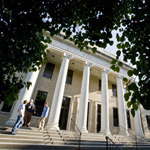What is sometimes referred to as “the digital age” is simply everyday life for today’s college students. So, to incorporate increased digital technology in learning as an element of Austin College’s strategic plan is to capitalize on the strengths and interests of learners. A three-year $500,000 grant from The Andrew W. Mellon Foundation in support of “Collaborative Pedagogies in the Digital Age” will make that possible.
The Mellon grant will enable faculty to better incorporate digital storytelling, blogs, podcasting, wikis, electronic notebooks, website creation, real-time collaboration with experts and colleagues around the globe, and digital film production to enhance learning opportunities.
Austin College President Marjorie Hass said many people think digital education means putting courses online and reducing direct contact between teachers and students. She is quick to point out that will not be the case at Austin College. “We are not looking for ways to take the professor out of the equation,” she said. “We are looking for ways to put the professor more deeply into it.”
“Just because students are digital natives and fluent in Twitter and other applications does not mean they are educated in effective communication using those tools,” Dr. Hass said. “When our students come to us, they already know how to read, but that doesn’t mean we don’t teach literature. This is the same thing. The Mellon grant will give our faculty and students the training and tools necessary to collaborate more effectively with each other and with our local and global partners.” Patrick Duffey, professor of Spanish and newly appointed associate dean of the faculty, will direct the Mellon program.
Above all, Austin College leaders say they expect this grant to help them reach their goal of providing a cutting-edge, 21st- century, educational experience. “People sometimes think a liberal arts college is something from the medieval period, with people walking around in robes,” said Sheila Amin Gutiérrez de Piñeres, vice president for Academic Affairs. “But check back in three years and see the innovative things our faculty will have done with this opportunity,” she said. “We will have a lot to talk about.”

